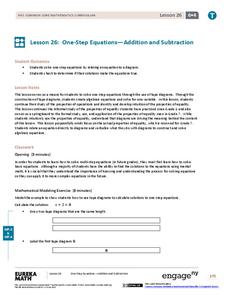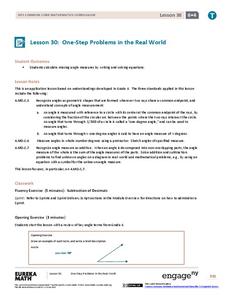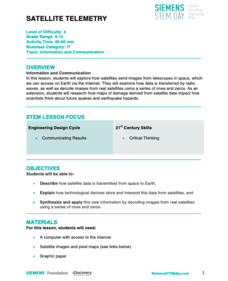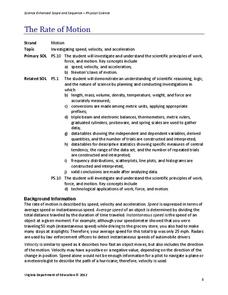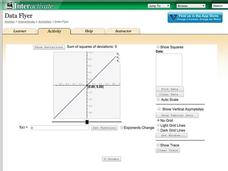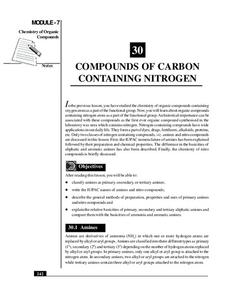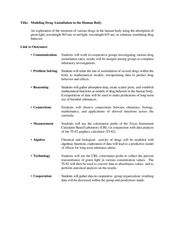EngageNY
One-Step Equations—Addition and Subtraction
Just one step is all you need to find success in solving equations. The 27th installment in a series of 36 teaches how to solve one-step equations involving addition and subtraction. Tape diagrams help future mathematicians in this task.
EngageNY
One-Step Problems in the Real World
Mirror, mirror on the wall, which is the fairest resource of them all? Individuals write and solve one-step equations for problems about angle measurement, including those involving mirrors. Both mathematical and real-world problems are...
EngageNY
Writing and Evaluating Expressions—Exponents
Bring your young mathematicians into the fold. Scholars conduct an activity folding paper to see the relationship between the number of folds and the number of resulting layers in the 23rd installment of a 36-part module. The results of...
EngageNY
One-Step Equations—Multiplication and Division
Discover one more step to being able to solve any one-step equation. Scholars continue their work with one-step equations in the 28th installment of a 36-part module. Tape diagrams and algebraic processes introduce how to solve one-step...
National Institute of Open Schooling
Compounds of Carbon Containing Halogens (Haloalkanes and Haloarenes)
Halogens comes from a Greek word which translates to make salt. Lesson 27 in the series of 36 teaches pupils about halogens. Pupils read, discuss, and answer questions in order to learn about haloalkanes and haloarenes. From defining...
Virginia Department of Education
Light and the Electromagnetic Spectrum
Lead your class in a fun-filled team activity that encourages collaboration while learning important concepts. Pupils actively participate in a discussion on the experimental design and the role of mirrors. They perform group activities...
Virginia Department of Education
Work and Power
Assist your class with correctly calculating the values for force, work, and power as they determine the amount various activities require. They gather data and participate in a group discussion to compare results upon conclusion of the...
Discovery Education
Satellite Telemetry
Satellites require rockets to launch, but it doesn't take a rocket scientist to understand them. Future engineers learn about how satellites send data to Earth and how to interpret satellite images. They see how radio waves play a role...
National Institute of Open Schooling
Colloids
Classes explore colloids through readings and questions in lesson 10 in a series of 36. They learn everything from methods of preparation and properties to how to classify colloids. They finish the lesson by seeing how to apply...
Curated OER
Anne Frank Brochure/Newsletter
Any instructional activity that includes time at the computer lab is a favorite for the kids! In this plan, the class heads to the lab to research Anne Frank and her life. Using both Internet and print resources (like the book), pupils...
Curated OER
Rooting One's Way to Meaning
Discover the Virtual Thesaurus with your class. They use the Virtual Thesaurus to assist them in an inquiry-based approach to discovering the meanings of some common Latin and Greek roots. Each child then teaches a particular root and...
Curated OER
Maximum/ Minimum Problems
In this optimization worksheet, students solve 20 short answer word problems. Students read, sketch, define variables, write equations, differentiate their equations, and find the maximum or minimum of each word problem.
Curated OER
Tangerine: Cubing Strategy
Here's an activity that uses a reading comprehension strategy based on Bloom's taxonomy to focus readers' attention on key passages from Edward Bloor's Tangerine. Worthy of a place in your curriculum library.
Virginia Department of Education
The Rate of Motion
How much time does it take to jump over three balloons? Pupils calculate the speed of tasks that require different motions. They determine motions for tasks such as walking, skipping, hopping, and jumping before creating a...
Teach Engineering
Rock and Boat
Present the class with a question on whether the water level of a pond will rise they take a large rock out of a boat and drop it into the pond. Groups come down on all sides of the question and try to justify their answers. The activity...
Inside Mathematics
Quadratic (2009)
Functions require an input in order to get an output, which explains why the answer always has at least two parts. After only three multi-part questions, the teacher can analyze pupils' strengths and weaknesses when it comes to...
Teach Engineering
Light Intensity Lab
Let there be light. The last installment of a seven-part series has pupils conduct an experiment on light attenuation through different numbers of transparency sheets. They then relate the results back to how X-rays measure bone density.
Shodor Education Foundation
Data Flyer
Fit functions to data by using an interactive app. Individuals plot a scatter plot and then fit lines of best fit and regression curves to the data. The use of an app gives learners the opportunity to try out different functions to see...
Curated OER
Braking Distance
This real-life model of braking distance motivates learners to approach quadratic equations algebraically, numerically, graphically, and descriptively.
University Interscholastic League
English Lesson to Prepare for UIL Spelling and Vocabulary Contest
"i before e. . ." Spelling is easier if kids know the eight basic spelling rules contained in this resource packet.
National Institute of Open Schooling
Chemical Arithmetics
Substances with the same empirical and molecular formula must be differentiated by their structural formula. Part two in a series of 36 has pupils using chemical formulas to calculate how much of a compound is present in a given...
National Institute of Open Schooling
Compounds of Carbon Containing Nitrogen
Amines are vital to humans because they help form amino acids, the building blocks of proteins. The 30th lesson in a series of 36 specifically focuses on the organic compounds that contain nitrogen. Learners classify amines and nitro...
Curated OER
Modeling Drug Assimilation in the Human Body
Young scholars investigate the accumulation of drugs in the body. In this algebra lesson, students collect data on drug retention and assimilation. They use their data to predict the behavior and effects of drugs.
Curated OER
English Vocabulary Skills: AWL Sublist 1 - Exercise 5b
In this online interactive English vocabulary skills instructional activity, students answer 10 matching questions which require them to fill in the blanks in 10 sentences. Students may submit their answers to be scored.
